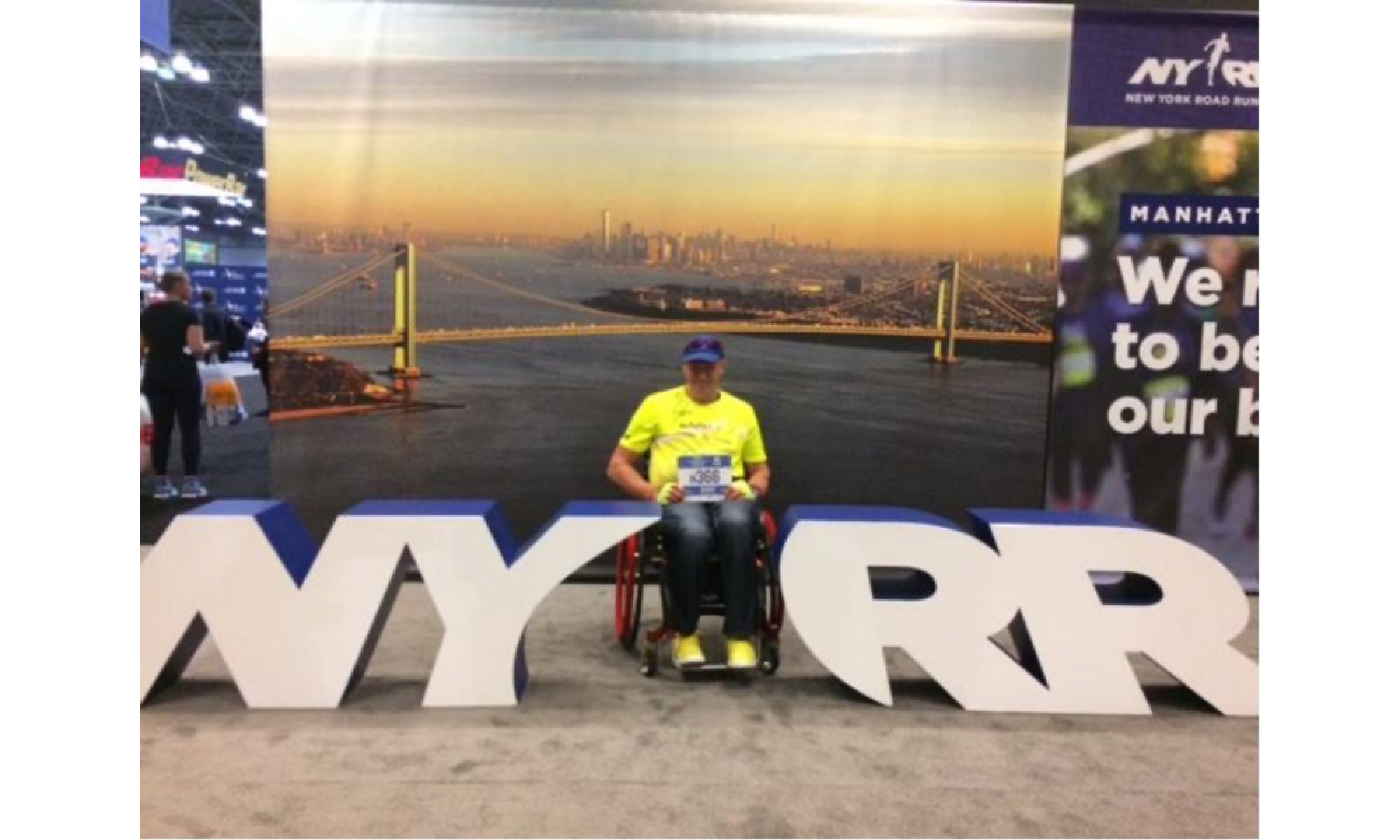Wheelie Travelling: My Top Tips - by Ian Walker

Image: Ian Walker at the 2017 New York City Marathon Expo with race number
With the opening of the Trans-Tasman bubble flights between New Zealand and Australia having resumed this is providing a much-needed boost to each nations' tourism sector. This got me thinking about travelling as a wheelchair user and the added complications that can and usually are faced as opposed to an able-bodied traveller.
When travelling I always ensure I carry out a pre travel check in. If flying I always ring the airline a week prior to the day of the flight advising that I am a wheelchair user, that I will require assistance in the form of an aisle chair at the plane’s door, if an airbridge is used or on the tarmac if not. Some airlines have this facility on their online booking system.
When packing, extra consideration must go into the length of the trip as this will impact on the number of consumables; catheters, suppositories, medical gel, medication I’ll need. There may also be my ‘off-road’ wheels to be included. Airlines are usually willing to allow extra bags/cases that are required at no additional cost although it is best to check ahead of time that extra bags for this reason are allowed.
There is also my portable commode chair that must be taken as most accommodations do not have padded seats for either the toilet or shower. This leads to careful consideration given to packing my van if I’m using it on my journey, making sure I fit everything in. On occasion, I send vital consumables to my destination in advance, as they can take up valuable room in my suitcase and it gives me peace of mind to know that these supplies have arrived safely.
The day of leaving always means a lot more organisation to ensure that I have everything I need for the trip ready and packed for either my own transport or the taxi or shuttle service. If flying that means arriving at the airport with plenty of time to spare before check-in as I do have more luggage than most so want to ensure it is all labelled and checked in. I recommend knowing the weight of your wheelchair as this is often asked for by airline staff.
When flying and prior to boarding I cannot go through x-ray screening, so I am subjected to a body search. Some are more invasive than others, all contents in my wheelchair’s bag under the seat having to be emptied out and, in the USA, chemical tracing for explosive residue on my wheelchair is checked. These security checks can be carried out by security staff with some dignity or, to my extreme annoyance, quite humiliatingly.
With an airbridge, boarding a flight is usually a smoother affair than when there is not one. The number of times I am told by airline staff that most wheelchair users they have dealt with walk onto the plane to their seat always baffles me. An added twist to flying as a wheelchair user is that I am required to board first before anyone else. As I sit in an aisle seat this can lead to some gymnastics being performed when other passengers must clamber over my legs to their centre or window seats.
Exiting a plane is the same only in the reverse. Transferring back onto the aisle chair is followed by transferring back onto my wheelchair hoping that it is still intact and undamaged from its storage in the hold during the flight.
Accommodation while travelling can also be a challenge as there is often a wide range of what people consider to be accessible. Many times, I’ve had issues getting into a motel unit, accessing its bathroom/toilet, even getting to towels on occasion, reaching a microwave, or plates and bowls that are placed at a height not for a wheelchair user. A ramp or wedge into a unit does not make it accessible. It is why therefore; I always ring prior to travelling to ascertain the motel/hotel meets my definition of accessible.
So, travelling certainly has its added complications for we wheelchair users, but they are never too great an obstacle to have one consider whether it is worthwhile to travel or not. Now that the trans-Tasman bubble has opened it is certainly hoped that this is the beginning of a post Covid-19 world where international travel becomes the norm again.
Bon voyage!
About the writer
Ian Walker is a 57-year-old C6 Quadriplegic Incomplete. Ian lives in Christchurch, New Zealand and has survived 2 separate spinal cord injury-related accidents over the past 14 years. He is a Motivational Speaker who talks about - how to face adversity, cycle road safety, living with a disability, being a 1 percenter . . .
Ian also enjoys life coaching which he utilises through his business BMotiv8d, to assist those with a disability, (or without), who lack motivation, direction and/or confidence, those who feel disorganised or unfulfilled, and/or those who need encouragement or need to set priorities, on how to realise their true potential.

Add comment